#gothic literature analysis
Text
Let's talk about the first names of the Dracula characters.
Jonathan - 'God has given', 'Gift of God'. First appears in the Bible as the son of Saul. A very popular name, though has risen in popularity more recently. In 1885, it was the 674th most popular boy name, whereas in 2021 it was 114th most popular.
John - 'God is gracious'. Popular biblical name with similar origins to Jonathan. In 1885, it was the 2nd most popular boy name. The nickname Jack also has Celtic origins which mean strong and healthy. In 1885, it was the 163rd most popular boy name.
Wilhelmina - Of German origin meaning safety or helmet. Queen Wilhelmina of the Netherlands who was born in 1880. In 1885, it was the 403rd most popular girl name. Mina means 'love'. In 1885, Mina was the 383rd most popular girl name and the name can be used as a term of endearment.
Quincey - A gender neutral name meaning 'estate of the fifth son'. This is perhaps symbolism of him being the fifth male in the Light Crew. It is derived from the Latin quintus meaning five. It is of French and English origin. In 2022, it was 9705th most popular boy name and 12552th most popular girl name. (The chart I am using doesn't go back to the 1800's, sadly.)
Arthur - Celtic, Latin and Welsh origin. It is believed to be derived from the word artos, meaning "bear." As experts differ on its precision origin, the name can also mean "Thor", "the eagle," and "strong man." Arthur became a popular choice during the Middle Ages, as families named their boys after King Arthur of 6th century England. Arthur's last names are very interesting too and I will make a post about their last names if people are interested. In 1885, it was the 12th most popular boy name, and now it is the 256th.
Abraham - Named after Bram Stoker. Meaning father of multitudes or father of nations. Named after the founder of the Jewish people. In 1885, it was the 384th most popular boy name, a position is withholds today. Of Hebrew origin.
Lucy - Meaning light bringer. Derived from the Latin, masculine origin Lucius. In 1885, it was the 76th most popular girl name and is now the 127th.
#dracula#john seward#goth lit#name meanings#abraham van helsing#arthur holmwood#quincey morris#lucy westenra#mina murray#jonathan harker#gothic literature analysis#gothic literature#name analysis
66 notes
·
View notes
Text
The Black Butler revival will, of course, in this day and age, be the complete embodiment of pro-ship vs. anti-ship discourse, given the subject matter.
But for those of you who are watching this for the first time in 2024 (which includes myself!), there are certain things about the show you simply must understand, for the sake of media literacy.
The first is that Black Butler is supernatural gothic romanticism at its core. This genre alone should tell you that the relationships integral to the plot will be complex, messy, and toxic, by default. That is not only a huge part of this genre’s appeal, but very much the point of the story.
The themes are dark, the terrible things that happen to the main characters are dark, and therefore the relationships at the forefront (and in the background) will reflect that.
The gothic genre has been alluringly popular for over a century (longer, if you know your history) because audiences are entranced by the macabre, the tainted antiheroes, the monsters who live inside us all. It’s popular for a reason.
That being said, understand that whether you, the viewer, ship Sebastian and Ciel or not is irrelevant. Their bond doesn’t need to be understood as romantic or sexual, but it sure as hell isn’t normal. It isn’t healthy. And the audience knows that. That’s the draw. It’s what makes them compelling to watch.
Ciel and Sebastian’s relationship mirrors many gothic novels, poems, and penny dreadfuls written in the Victorian Era (the very same time period in which Kuroshitsuji takes place). The Victorian folks who read these tales for the first time ate that shit up, because it was tantalizing. It was shocking. It was inappropriate, and monstrous, and violent, and erotic, and went against societal norms. But that was the point.
A huge part of gothic romanticism is the blatant sexualization of the relationship between the “monstrous” characters and their human counterparts in the story. Sex itself doesn’t need to take place for their bond to be sexually charged. The forbidden nature of their relationship—which typically involves layers of social taboos, moral ambiguity, or simple infatuation—is what makes their interactions erotic. Sexual contact rarely ever actually happens in these stories. It’s the taboo nature of their bond that creates the tension.
One of the many reasons audiences love this genre is the constant question of morality in its themes. Who, between them, is the real monster? Could the human character have ever been saved? This genre is often associated with tragedy, because the bond forged between the characters in these stories are destined to end in death and destruction. The reader knows it can’t end any other way. How can it?
But an integral element of these gothic tales is the catharsis that comes with this tragedy. The corrupted human often gets what they want in the end, even if it’s at the cost of their own life. Whether they regret their choice to foster this monstrous relationship varies on the story, but it doesn’t change the trajectory of their descent.
Sebastian and Ciel’s relationship is the whole plot of Black Butler. Their closeness bears a grotesque ick factor, but it is deliberate. It is a constant reminder of how unnatrual their bond truly is. Rationalizing or watering down how abnormal they are about each other misses the point entirely. They will never have a normal, healthy relationship, and that’s what moves the plot forward.
That’s why you’re watching it.
#black butler#kuroshitsuji#ciel phantomhive#sebastian michaelis#the soundtrack repeatedly uses gregorian chants of the agnus dei. like COME ON. gothic media loves a catholic allegory#gothic literature#gothic romanticism#neo queen serenity’s posts#please remember to be civil! or else my block button will be upon ye#black butler analysis#kuroshitsuji anime#yana toboso#black butler anime#classic literature#black butler meta#black butler season 4#black butler s4#kuroshitsuji season 4
387 notes
·
View notes
Text
it's immediately clear that both the creature and victor find some of their greatest comforts in nature and that's one of the key features that connects them and proves they're not so different from each other, but i've also noticed that they tend to admire different TYPES of nature
victor tends to amaze at "the high and snowy mountains [...] immense glaciers [...] the rumbling thunder of the falling avalanche [...] the supreme and magnificent mont blonc" (65), typically finding the most comfort in the "savage and enduring scenes" (64) which tend to be colder and rougher yet unchanging; while the creature found that his "chief delights were the sight of the flowers, the birds, and all the gay apparel of summer" (94). there is probably something to be said about the creature's affinity for spring and summer, the seasons of rebirth, of NATURAL and beautiful life, a direct contrast to his unnatural, coldly scientific, "wretched" rebirth that he abhors so much
i was discussing this idea with a friend, who added that victor finding solace in the frozen and dead beauty of wintery environments, a typically less-favoured season, could reflect how victor often refuses himself the typical joys of life. throughout the novel, he struggles with his self-worth because of the guilt induced by his creation of the creature and the deaths that then followed, and the only reason he even desires peace and comfort is because he knows he needs to present himself that way to his family in order for them to be happy ("i [...] wished that peace would revisit my mind only that i might afford them consolation and happiness" [62]). i built on her idea by noting how the creature acknowledged that he "required kindness and sympathy; but [he] did not believe [him]self unworthy of it" (94), a completely contrasting stance from victor, who finds himself undeserving of the many comforts offered to him by his family
furthermore, it seems that victor finds beauty in glory & majesty ("[the scenery] spoke of a power mighty as Omnipotence--and i ceased to fear, or to bend before any being less almighty than that which had created and ruled the elements" [64]), while the creature finds beauty in warmth & growth. both characters seem to find what they desire(d) in the versions of the natural world that they admire most
to reference what i said in the beginning about the connections between victor and the creature, this observation only contributes to my understanding that victor and the creature are incredibly similar, and many of their identical traits involve a rejection or a reversal of the other; they both ardently wish for each other's destruction, they both ruined each other, they're the reason that the other is simultaneously a victim and a villain in their own sense, they both hate themselves but for reversed reasons (victor hates himself for what he's done rather than what he is, while the creature hates himself for what he is more than what he's done), and now this--they both find solace in nature, just opposing kinds. like father, like son
#if any of my friends see this#hiii#my apologies if i missed something crucial#i hope this makes sense. maybe it doesn't#maybe i didn't make any points at all! or maybe this is already well-known information#frankenstein#frankenstein the modern prometheus#mary shelley#mary shelly's frankenstein#classic lit#classic literature#gothic lit#gothic literature#frankenstein a new musical#literary analysis#victor frankenstein#frankenstein's monster#frankenstein's creature#adam frankenstein
485 notes
·
View notes
Text

I have so many feelings about that one word.
Disgusted.
As a word it brings forward such visceral reaction in me - it’s a word that’s been used against me in times of trauma throughout my life, it’s a word that as a queer person, I have become intimately acquainted with.
I think it’s what draws me to Saltburn - the film is so gloriously and proudly disgusting, it relishes in the gross and the wet and the grotesque.
We can see the influences of Gothic Literature - from which so many queer coded stories have come already - think bloody, raunchy 80’s horror movies where the body horror is not as much about mutilation as it is creation; often of seemingly queer, particularly trans, bodies. (Re Animator franchise I’m staring directly at you.)
But this is why so many of us have fallen head over heels for Saltburn, because it’s relatable to the soul of a lot of people’s queerness - we have always been told we are disgusting, but here is a film that revels in a state of disgust. Saltburn is relatable not because we’re all a bunch of drain-lickers (if you are, though, power to you) it’s relatable because the film itself feels self-consciously disgusting. The horror for Oliver is being presented with this: and the catharsis for all of us is loving the disgusting in spite.
#saltburn#saltburn 2023#saltburn movie#oliver quick#felix catton#gothic literature#saltburn analysis
109 notes
·
View notes
Text
Why, Dorian?!
*SPOILERS*
Why does Dorian kill Basil? We’re not given much of a reason beyond mad passion, a random onset of hatred:
Dorian Gray glanced at the picture, and suddenly an uncontrollable feeling of hatred for Basil Hallward came over him, as though it had been suggested to him by the image on the canvas, whispered into his ear by those grinning lips. The mad passions of a hunted animal stirred within him, and he loathed the man who was seated at the table, more than in his whole life he had ever loathed anything.
We’re not explicitly told why Dorian suddenly feels such hatred for Basil, but here’s my theory:
At this point, Dorian has well and truly gone off the deep end. The state of the portrait makes that clear (and remember, the description we’re given is of the portrait before Dorian murders someone). He’s an evil person. And Basil finally realizes that, once it sinks in that the picture is the same one he painted.
So, what does Basil do? Does he run and scream? Does he curse Dorian? Express regret that he and Dorian ever met? These are the reactions that Dorian is expecting. He’s probably gotten such reactions before, from other people whose hearts he’s broken. Remember, Dorian’s been taught to be cynical by Lord Henry, so, Dorian’s cynicism is deeply-entrenched by now. He values beautiful things because he does not value people, and maybe assumes that everyone is as bad as he is deep-down. I think he expects Basil to hate him.
Instead, Basil encourages Dorian to ask God for forgiveness, to redeem himself. That demonstrates that Basil still loves Dorian, and that Basil himself is willing to forgive Dorian. He’s also not a cynic -- he believes that everyone deserves a chance at redemption, as a Christian is supposed to. And Dorian recoils a bit. “What? I can’t be redeemed, Basil! I’m Evil with a capital E!” And, as if to prove it, Dorian stabs him. Dorian experiences the wild hatred for Basil in that moment because Basil’s reaction is dissonant. It contradicts Dorian’s worldview, and maybe makes him feel guilty for the first time in a while. Rather than deal with that, Dorian kills the last person who sincerely believed he could be better.
Also, I love the image of Dorian idly sniffing the flower and then crushing it in his hand -- he enjoys Basil’s passion for him in an indifferent and detached way, then casually destroys it.
#dorian gray weekly#dorian gray#the picture of dorian gray#basil hallward#oscar wilde#gothic literature#gothic lit#literary analysis#literary criticism
476 notes
·
View notes
Text
"You and I Have Begun to Blur"
This is eating my brain from inside, so here's the thing: one of my favourite aspects of Hannigram as a ship is their balance - the way they mirror and complete each other, functionally two halves of the same whole; but what is even more fascinating is that, in a literary sense, Hannibal and Will are, in fact, inspired by two opposing aspects of the same man.
It all begins (like many other things) with Lord Byron; specifically, the summer he spent with a group of friends at Villa Diodati in Geneva, and the dare, that each member of the group would write a ghost story - one of which was Dr. Polidori's The Vampyre. This novella, which introduced the vampire legend to Western popular culture, defined its archetypes for centuries to come; and as such, Polidori's Lord Ruthven, who was based on Lord Byron, became a blueprint.
He is dark, foreign, seductive, dangerous, hypnotizing, hedonistic, possessive; his relationship with the main character, Aubrey, is markedly homoerotic - and these qualities endure as the archetype is passed down the generations. From Ruthven, we get Carmilla, Dracula, Lestat - and, indeed, Hannibal Lecter.
From this:
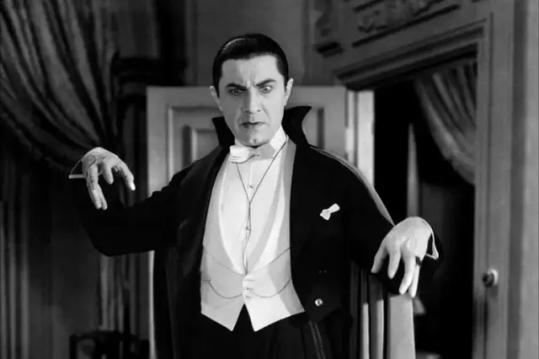
To this:
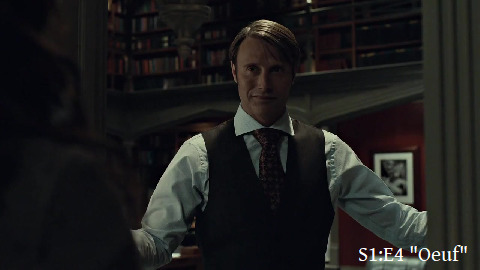
he is still, recognizably, a Byronic villain. Whether he operates within an overtly supernatural genre, or a psychological thriller, he is still confident, dominant, manipulative, and always representative of forbidden (queer, interracial, extramarital, etc) desire and temptation.
However, The Vampyre was not the only piece written for the same dare, not the only piece that left a legacy within popular horror, and, most importantly for this context, not the only piece that featured a Byronic character. Mary Shelley's Frankenstein introduced a second such archetype into the gothic genre - inspired by her own understanding of Lord Byron; so, while her Victor Frankenstein shares the same dark hair and pallor as Polidori's Ruthven, there is an ocean of differences between the two.
Victor Frankenstein is a Tortured Genius. He is odd and wild, passionate, prone to isolation; a misfit from the start, always lonely despite the few connections he has, and never truly understood. His intellect is both a gift and the source of his ruin, and he is plagued, in equal measure, by both pride and guilt.
In both looks and character, he passes almost unchanged - from this:
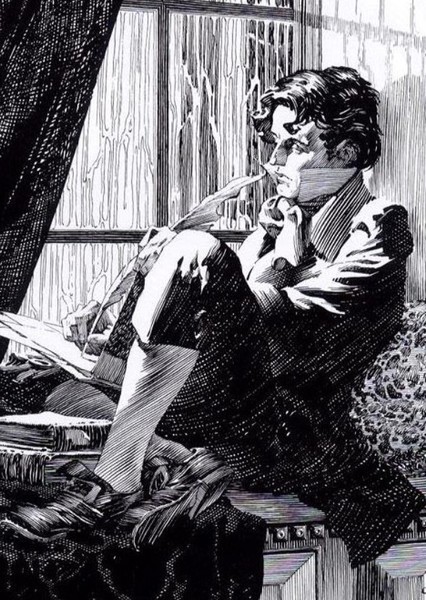
To this:
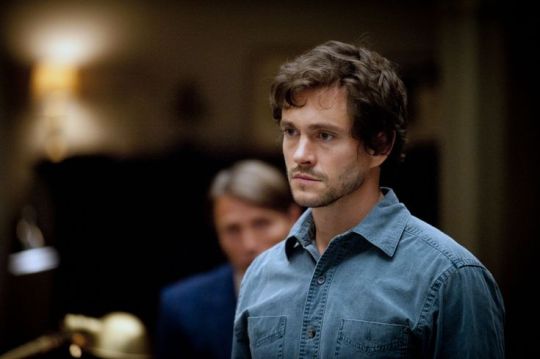
Even centuries later, he is still the smartest man in the room, he is always tormented, and his counterpart is always a Monster. We see him pop up throughout horror media - as poets, composers, detectives - reflected in Edgar Allan Poe's Roderick Usher, Lovecraft's Henry Wilcox, or Spencer Reid of Criminal Minds. Unlike those of Ruthven's lineage, these people are usually either frail or sickly, socially awkward, uncertain of themselves except for a specific area of expertise, and their sanity commonly tends to be in question.
Despite such differences, though, all these characters are Lord Byron's legacy, weaving their way through history - on the page, on the stage, on the screen, it matters not. By the time they meet again in NBC's Hannibal, they are as separate as two entities can be - yet entwined more closely than any other genre would allow.
Frankly, it drives me feral.
There is so much here to unpack - they are a whole, and yet separate, each with his own archetypal history. Does something within Will Graham's bones remember Frankenstein when he stands in the forensic lab, surrounded by corpses?.. On the Doylist level, does that inform the acting - however subconsciously - in any way?.. Does Count Hannibal Lecter have Lord Ruthven's smile - or Lord Byron's?.. Does he know?
How much is reality?
How much is fiction?
How much is lost through interpretation? How much is remembered? How much does anyone ever really Know us, truly, when two of Byron's closest friends saw entirely different people in him?
I don't know. We can never know. What is evident, though, is that Hannibal Lecter and Will Graham are two halves of the same soul - and that this soul aches to be complete.
#hannibal#hannigram#hannibal lecter#will graham#dracula#victor frankenstein#gothic fiction#gothic#gothic literature#literature#history#nbc hannibal#hannibal nbc#hannibal meta#hannibal analysis
99 notes
·
View notes
Text
One of the things that piss me off the absolute most about popular academic Frankenstein analysis is the “Victor Frankenstein is sexist” take. Like I know I’ve spoken about this quite a lot before but god damn it’s like people just look at the text and see, “(I) looked upon Elizabeth as mine—mine to protect, love, and cherish. All praises bestowed on her I received as made to a possession of my own.”, and they just immediately go, “Oh! Oh! Sexism! Misogyny! Victor Frankenstein is a sexist! Why does he want to create the perfect man, huh? *gasp* is it because he thinks women are inferior?”
When if those people pulled their heads out of their asses for five minutes and read the rest of that paragraph, “On the evening previous to her being brought to my home, my mother had said playfully, “I have a pretty present for my Victor—tomorrow he shall have it.” And when, on the morrow, she presented Elizabeth to me as her promised gift, I, with childish seriousness, interpreted her words literally and looked upon Elizabeth as mine (…)” along with the fact that Victor explicitly says he was “about five years old”, they’d maybe consider, “huh, maybe it’s very fucked up of a mother to give her to her son as a gift and spent her entire life basically shipping these two adopted siblings together until, on her death bed, she says, “my firmest hopes of future happiness were placed on the prospect of your union. This expectation will now be the consolation of your father.” Wow, maybe that’s kind of fucked up. Maybe painting, again, a five year old, who was honesty for all intents and purposes pretty much just manipulated into thinking it was his duty to marry his adopted sister out of respect for his dead mother’s last wishes who died when he was seventeen, as a wife-beating woman hater who reanimated the dead to spite half the human population, is very very fucked up!”
Like I can’t stress this enough – both Elizabeth and Victor are victims here. Of course as the story goes on a bit and Victor is a grown adult man who’s still avoiding his feelings and fucking off across the continent with his buddy pal best friend every five minutes instead of facing his mistakes and emotions, yeah, he is honestly more or less to blame for Elizabeth’s death, but that isn’t misogyny. Avoidance of everything is like one of his integral character flaws.
And I mean if you thought the 1831 republication had some creepy undertones, look at the bloody original 1818 version.
“(My uncle) request(ed) my father (…) take charge of the infant Elizabeth, the only child of his deceased sister. “It is my wish,” he said, “that you should consider her as your own daughter, and educate her thus.”’
So just explicit incest, basically. And again, if you thought Victor’s mother was a bit creepy and pushy in the republication,
“I have often heard my mother say, that she was at that time the most beautiful child she had ever seen, and shewed signs even then of a gentle and affectionate disposition. These indications, and a desire to bind as closely as possible the ties of domestic love, determined my mother to consider Elizabeth as my future wife; a design which she never found reason to repent.”
“………A desire to bind as closely as possible the ties of domestic love?” My brother in Christ you were groomed. Fun fact, I read the 1818 version first and read that in the middle of form class and sat for a good five minutes staring flabbergasted at what the fuck I was reading.
So no, dear God no, nowhere in the text does it imply Victor Frankenstein hates women. I mean honestly it’s kind of shown in the way he talks about the Creature’s Bride that he doesn’t view women as objects and does, in fact, view them as people.
“He had sworn to quit the neighbourhood of man and hide himself in deserts, but she had not; and she, who in all probability was to become a thinking and reasoning animal, might refuse to comply with a compact made before her creation.”
My guy basically says “well what are we expecting her to do here, immediately marry you just because she was told to?”
(Just a fun little comparison I noticed there – not to turn the conversation back to my whole “does Victor is gay” theory but I think it is interesting that Victor thinks that, that he does go “well she can’t just be expected to marry someone just because she was told to!” and then suggests to himself that she would probably rather “turn with disgust from him to the superior beauty of man” – interesting, Victor. Like Clerval’s “form so divinely wrought, and beaming with beauty”? Interesting as well that after Victor comes to that conclusion and destroys the Bride, the Creature immediately then kills Henry and only then does Victor finally go “well. I finally have to marry Elizabeth.” Feeling disheartened by sparing her your predicament only to be thrust even deeper into your own, are we?)
But yeah. “Victor Frankenstein is a full-blown women-hating misogynist” takes really piss me off. Another case of “oooh yes let’s cherry pick the text scouring it for anything we can possibly use to turn things back around to the same few analysis points we’ll reuse over and over instead of possibly considering that just because a text is written by a woman doesn’t mean that it’s a massive rant on the patriarchy disguised as a science fiction novel.”
Maybe that’s kind of sexist itself. Maybe women can just write kick-ass gothic horror sometimes. And maybe just because a work definitely has undertones about sexism and misogyny (like, fair enough, a lot of Elizabeth’s character definitely does) that doesn’t mean that the male protagonist wants to kill all women! And surprise surprise as well, works can comment on misogyny and patriarchy and acknowledge that women are treated badly in society and have been in differing ways for hundreds of years, without going “all men are inherently evil and fuck them all”. Bit of a side rant that I won’t go all into here, but just worth mentioning that after seeing this over and over again in media and analysis of media over and over again, hey, misandry won’t fix misogyny. It just makes everything considerably stupidly worse. –your friendly neighbourhood bisexual
#gothic lit#classic literature#gothic literature#goth lit#classic lit#frankenstein#frankenstein weekly#frankenstein or the modern prometheus#Victor Frankenstein#Elizabeth Lavenza#Frankenstein analysis#Clervalstein#(kind of)#frankenstein everyday
267 notes
·
View notes
Text
i had grown up thinking that 1) frankenstein’s monster was named frankenstein and 2) that he was some evil murderous freak just because of how he is usually portrayed in the media (i haven’t seen any frankenstein movie adaptations or anything i just went by a general consensus) so when i finally read frankenstein at the beginning of this year the contrast for who he really is stunned me so much i began to cry when the book swapped to his pov ans he speaks, quite elegantly, about his experience with being thrown out by victor and how the only friend he made was with a blind man. he deserved so much better :(
#frankenstein#mary shelley#gothic literature#gothic lit#scifi#victor frankenstein#frankenstiensmonster#i’m literally the monster btw#classic literature#classic lit#lit analysis from an old man
100 notes
·
View notes
Text
one of my favorite theories about wuthering heights — which is admittedly controversial, probably disliked by many, and can never be definitively proven — is that heathcliff may have been mr. earnshaw's bastard child.
if mr. earnshaw didn't feel some paternal responsibility for him, then it really does make me question why he would take in a random poc kid from the city he often stayed in on business trips (which was notably liverpool, a city famously known at the time for the slave trade as well as for prostitution!), and then favor that child over his previously beloved son, especially when his wife is racist & the story is set in rural 18th century england, & liverpool was probably full of homeless orphan kids he had seen before, but i don't believe he ever mentions wanting to take in any other child, and i don't believe mr. earnshaw is described as being a particularly generous man on the whole either (although he does seem initially fond of his children when he tells them he's going to bring them back gifts).
and we never learn anything about heathcliff's background or if "heathcliff" is supposed to be his surname or his first name — so it would make sense if maybe mr. earnshaw simply wanted to conceal that he wanted to name him "heathcliff earnshaw" but his wife &/or societal conventions would never allow it.
consider: 1 heathcliff & hindley's brotherly rivalry, 2 the linton/earnshaw families are supposed to parallel each other so edgar/isabella and heathcliff/cathy would be paralleled even more if the latter two were genetically related considering both married the other two, 3 this theory fits with the traditional gothic incest theme in literature, 4 heathcliff sees himself in hareton earnshaw and even has a whole monologue about this, 5 heathcliff/cathy being half-siblings sort of adds to their whole soul connection thing.
Edit: in my struck-through text, I had forgotten here that in chapter 3 we learn Heathcliff is named by the family after Earnshaw's dead son (whose idea was it exactly? I assume Earnshaw's): "This was Heathcliff's first introduction to the family. On coming back a few days afterwards (for I did not consider my banishment perpetual), I found they had christened him 'Heathcliff': it was the name of a son who died in child-hood, and it has served him ever since, both for Christian and surname. Miss Cathy and he were now very thick; but Hindley hated him: and to say the truth I did the same; and we plagued and went on with him shamefully: for I wasn't reasonable enough to feel my injustice, and the mistress never put in a word on his behalf when she saw him wronged."
#wuthering heights#heathcliff#heathcliff wuthering heights#literature#english literature#emily brontë#my writing#my essays#my analysis#theories#fan theories#gothic literature#lit
38 notes
·
View notes
Text

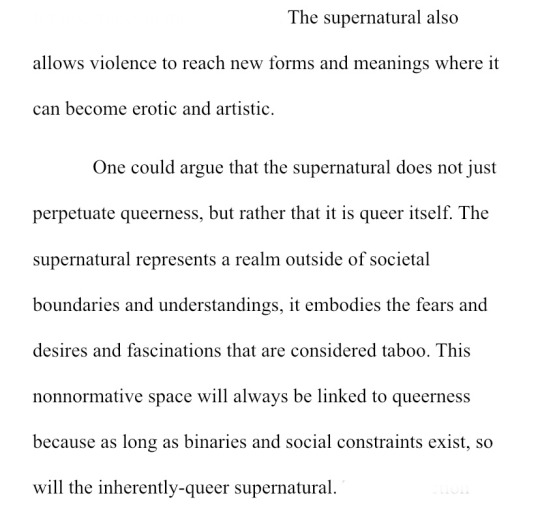
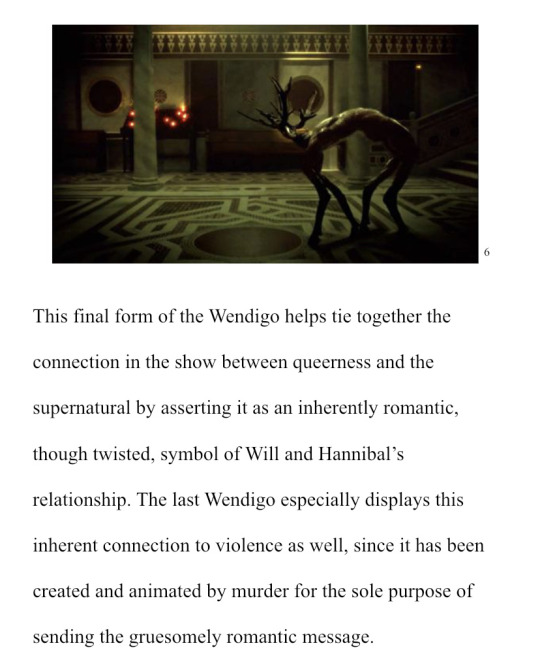
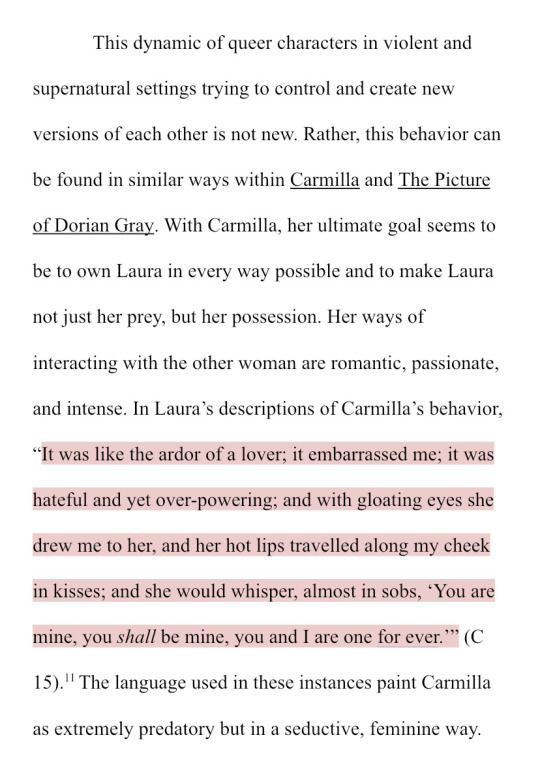
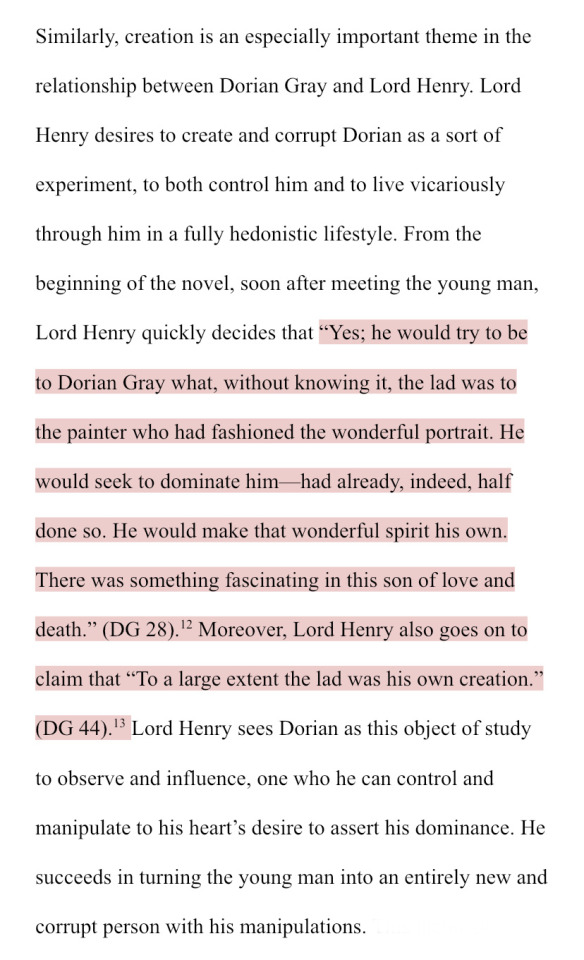
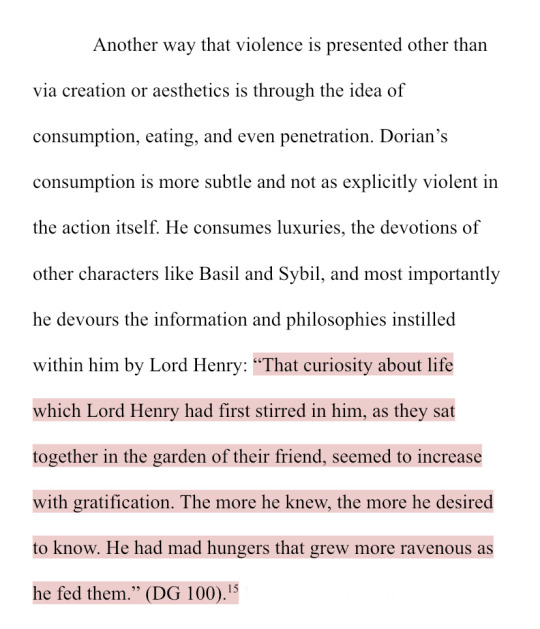

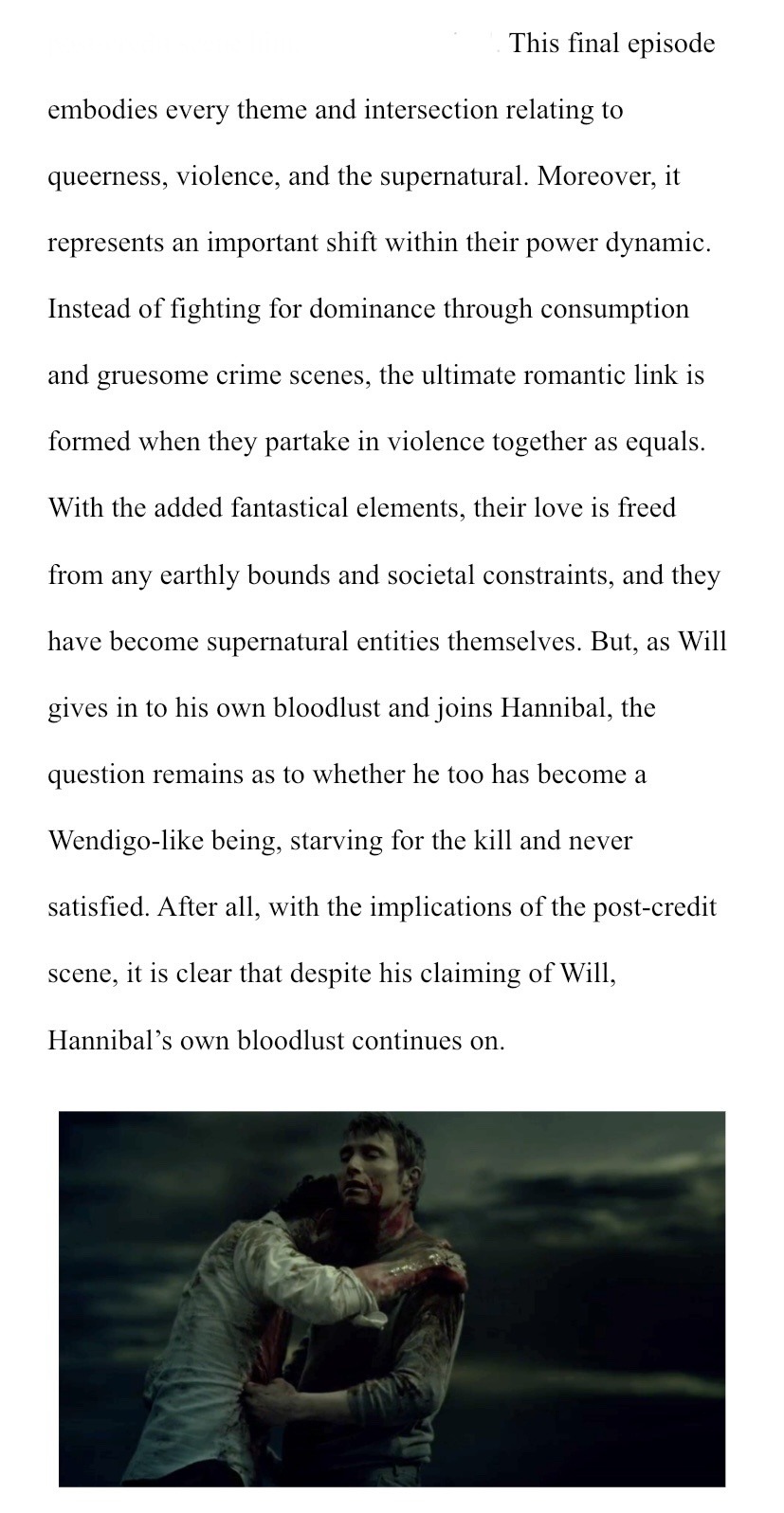
Comparison of Hannibal with queer romantic heroes from classical Gothic literature in “Queerness and the Supernatural in Hannibal’s Visions of Violence” essay.
#hannibal meta#hannibal analysis#hannibal nbc#hannigram#hannibal lecter#will graham#hannibal essay#queerness#queer#queer gothic horror#gothic literature#carmilla#the picture of dorian gray#wendigo#horror analysis#horror meta#vampires#sheridan le fanu#oscar wilde#gothic romance#queer horror#homoerotism#homoerotic
615 notes
·
View notes
Text
It’s a fairly common thing to hear that monsters, especially in Gothic literature, represent societal fears of the era they came from. While there is a lot to be said for this point, I think the reason so many people (myself included) love monsters so much is because, almost universally, they represent ‘otherness’ and their scariness is supposed to come from the fact that they are unnatural, vastly different from humans, incomprehensible, ext. Anyway, I think it’s interesting that this otherness is so pervasive in gothic literature monsters because one of the hallmarks of gothic horror is a sense of isolation, usually in setting but sometimes our protagonists are also just very isloated from society.
Frankenstein’s creature is considered a monster within the first moments of his life- “...but now that I had finished, the beauty of the dream vanished, and breathless horror and disgust filled my heart,” Victor writes. The creature is outcasted by everyone he encounters, though he’s done nothing wrong and has even helped people, in the cases of the DeLacey family and the little girl. Nothing he does can erase the fact that he is so fundementally different from everyone else that they will always hate him. “I am malicious because I am miserable,” he says. He is a monster in the world’s eyes for existing, and so he truly becomes a monster to try and get back at the world that has caused him so much pain.
Edward Hyde is a fascinating example of this otherness because, at first glance, he is just another fully-evil monster. And while I think it’s fair to say that he isn’t a good person, it’s also fair to say that, since he is the physical embodiment of everything Jekyll had tried to repress about himself, he also is ‘other’. “Many a man would have even blazoned such irregularities as I was guilty of; but from the high views that I had set before me, I regarded and hid them with an almost morbid sense of shame.” Here we see that, even from a young age, Jekyll thinks of his ‘irregularities’ as marking him different from the people of high society that he is surrounded by. There is also a very interesting line later in the book- “All human beings, as we meet them, are commingled out of good and evil; and Edward Hyde, alone in the ranks of mankind, was pure evil.” I think it’s interesting because this is what is supposed to drive home how bad Hyde is- he is different from everyone else. There is no other person on earth like him. Even though this line tells us he’s evil, I’ve always thought it presented him in a really sympathetic way.
The Phantom is like Frankenstein’s creature in that the text is pretty forward about ‘otherness’. “Poor, unhappy Erik! Shall we pity him? Shall we curse him? He only asked to be ‘some one’, like everybody else! But he was too ugly! And he had to hide his genuis or use it to play tricks with, when, with an ordinary face, he would have been one of the most distinguished of mankind! He had a heart that could have held the empire of the world; and, in the end, he had to content himself with a cellar.” All throughout his life, despite his great skill in many areas, Erik was ostracized (and in many cases, almost killed) by everyone he met, because he was different. No amount of artist genius or human kindness could overcome that. Thus, like Frankenstein’s creature, he became violent and angry.
I think they should all start a support group bc heaven knows they need it
#despite calling myself therantingraven this is the first rant ive posted#anyways tho this is why i love monsters especially these guys#and also why i cry(figuratively) whenever someone insults them#i should write an actual analysis on this sometime#honestly i had no real point with this i just wanted to talk about my favorite monsters <3#Frankenstein#Dr. Jekyll and Mr. Hyde#The Phantom of the Opera#Adam Frankenstein#Frankenstein’s creature#Edward Hyde#Erik#no clue what to call that guy tbh#Gothic lit#gothic literature#The Raven's Rants
497 notes
·
View notes
Text
this is your sign to start reading the introductions and prefaces at the beginnings of classic books because it’s LIFE CHANGING! it can change your whole perspective on a book. It gives you so much context and great topics to consider while reading, and actually helped my reading comprehension. Also gives you so many ideas if you're planning on doing a literary analysis!!
#classic books#classic lit#gothic literature#Classic book#classic literature#literature#literature analysis
14 notes
·
View notes
Text
Schrödinger's Hyde: In this box we have a Victorian scientist that is simultaneously both a well-respected doctor, and a horrible small man. It is only when we open the box that, depending on the context in which he is being observed, the bastard changes himself into what he considers most beneficial.
#new charachter interpretation guys#had metaphysics today#jekyll and hyde#literature#mr hyde#dr jekyll#literature analysis#classic literature#gothic lit memes#litposting
362 notes
·
View notes
Text
For those who are reading Dorian Gray, I just want to emphasize something:
A lot of adaptations make Dorian’s breakup with Sibyl Lord Henry’s fault, either indirectly (through giving Dorian bad romance advice) or directly (taking him to a brothel instead of going to see Sibyl perform). For some reason, adaptations seem really adverse to portraying the breakup as-written, which is a problem, because this is so important.
Dorian’s breakup with Sibyl is entirely his own fault. It’s a sign that Dorian was never really that great of a person, independent of Harry’s influence, and that he’s already cruel before shit starts really going down. It also is a point towards my self-serving theory that the story is not a cautionary tale about hedonism, it is a cautionary tale about taking art too seriously. More on that to come!
#the picture of dorian gray#dorian gray#dorian gray weekly#oscar wilde#gothic literature#gothic lit#literary analysis
295 notes
·
View notes
Text
I’m going to be honest I don’t like victor Frankenstein (due to my own personal reasons) but I hate when people over simplify him. I hate the claim he was the real monster all along,how he was weak,etc etc…hell I hate the over simplification of the creature the uwu ification of him ,he did nothing wrong rhetoric. As a disabled man it’s also quite infuriating hearing how people talk about victors health and mental state,even finding myself relating to victor on occasion . I feel when people talk in defense of one they always over simplify the other,they both are wrong there is moral high ground in this story.victors family and himself did not deserve what happened to them,the creature getting abandoned left to the cruel world was not deserved. Mary Shelly wanted you to emphasize with both of them it’s clear on it’s written and how it ends, there is no “winner” ,everyone victor cared about is dead he dies thinking it’s his fault,the creature dies more miserable than ever and ALONE. Going into this book you can’t go in with black and white thinking .this is coming from someone who struggles with it as a autistic man with Severe abandonment issues ,Its a tragedy for a reason neither are exempt from criticism or sympathy ,and both were gentle souls turned into shells of what they once were.
#frankensteins creature#victor frankenstein#frankenstein#gothic literature#mary shelly's frankenstein#ramblings#bipolor#media analysis#they both suck#you’re not morally better for liking the other more …also guys it’s allowed to like morally grey characters#victor is not the devil
10 notes
·
View notes
Text
Dorian Gray Weekly, Chapter 1
Okay.
I know I shouldn't be surprised.
I was informed, over and over and over, how un-heterosexual Mr Basil Hallward is.
But I'M SORRY
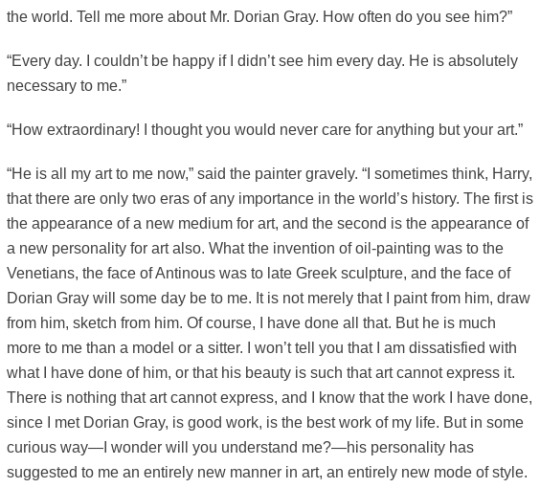
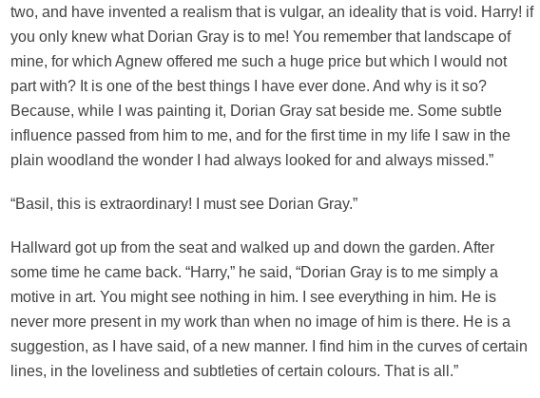
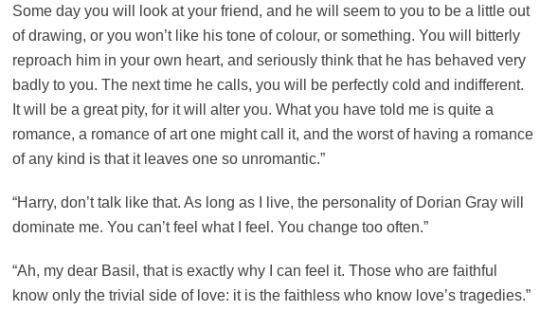
I was NOT IN ANY WAY PREPARED for THIS.
And this is just the first chapter. We haven't even MET Dorian yet.
I think I'm going to like this book.
#dorian gray weekly#the picture of dorian gray#basil hallward#gothic literature#i'm probably going to write some kind of mini-analysis on the prologue later#but now is not the time#now is the time for basil hallward brainrot
78 notes
·
View notes